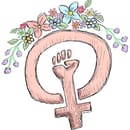To all the men who call themselves allies, but choose to criticize me and the hard work other people of color are doing, and who choose to say that if we want to be heard we need to work harder and be louder: stop asking, “How can I help?” Just stay in your lane.
I’m a brown Latina, daughter of two strong and brave Mexican immigrants, one of six children and the second oldest.
Hello everyone! Welcome back to my ongoing discussion of diversity, stereotypes, and inclusion (as well as lack of inclusion).
This past month I have learned that not everybody has the same definition of what it means to be an ally, and much less an ally to women of color.
As I scrolled through Instagram a while back, I saw Michelle Obama had posted a small excerpt from her book Becoming, which provides a one of a kind look into her life and discusses how she was able to find her own voice in the White House as a black woman. In the small clip she shared on Instagram, she read how she had to adjust her facial expressions and her tone of voice when having a conversation with people because they would think that she was mad or angry. This idea of the “Angry Black Female” is such a horrible yet incredibly common stereotype for black women. When a white man comes into the room ready to have a discussion, he doesn’t have to think twice about what he’s about to say or how he’s going to say it. But when a woman walks into the same room, she has to think about everything from how she walks to what the first words that come out of her mouth will be, all before she even dares to open her mouth.
There are completely different levels of expectations for the different genders. A woman’s argument is not viewed through learning and attentive eyes, but rather through judgment and criticism.
I remember being in my third year of high school and joining the debate team. I knew that I eventually wanted to go into a legal career and that learning argumentative skills along with acquiring research abilities would eventually come in handy. As I started researching the monthly topics and building my cases, I became very passionate about the points on which I wrote. I cannot forget the first moment I walked into the room with my debate case in one hand and my pens and phone in the other; I was so nervous I was ready to make up any excuse just so I wouldn’t have to stand up and read my case in front of a stranger. But once I started, the words began to flow out of my mouth. The other team was made up of two well-dressed white freshman boys. My team consisted of me and my white male partner. Once we finished the debate, the judge (a parent volunteer) sat us down and told us who won and why. She told me and my partner that we had lost because we were too aggressive with our opponents and needed to pay more attention to the other team’s points. As we were leaving the room, she pulled me aside and suggested that I shouldn’t be so loud and aggressive next time. Apparently for her, she only noticed that I was being way too aggressive with the young boys. Apparently, she didn’t notice when the young boys raised their voices at me, shutting me up and not allowing me to get my point across.
This is simply one example of many personal experiences I have gone through where my volume and words were analyzed with more judgment than any other person in the room.
Women of color are judged, criticized, and penalized for trying to be a part of the conversation and for raising awareness on issues that no other person could understand better than the people who are experiencing it firsthand. No one sees or pays attention to us or includes us in the conversation, but as soon as a white person begins to explain the issue that we were talking about hours before, they are rewarded and glorified for “enacting change” (this is called “white privilege” — not all white people do this consciously). Then when we call people out on this, they tell us to work harder, be louder, and to demand our spot at the table. As soon as we get to the table, they try to censor us. Men who call themselves our allies are sometimes our biggest oppressors, our biggest critics trying to tell us to relax and to get over it.
As soon as I even try to raise my voice to the same level as the man or white counterpart sitting beside me, they tell me to relax, to calm down. They ask me why I got mad. They ask me if I’m on my period. They ask me why I’m so angry at them. What I do does not revolve around you!
Don’t confuse my passion with anger. Don’t assume that because I am a Latina woman, I am sassy, loud, and weak.
Women, especially women of color, have to work ten times harder than any other person. We already deal with the constant judgment given to us by white men and the racist stereotypes from people who are too lazy to even try to understand. The last thing we need is to be judged and criticized by our own brothers of color, and by our community.
Being an ally is standing with us during the good times, but most importantly, it’s helping us get up during the bad times.
Image Source: 1



